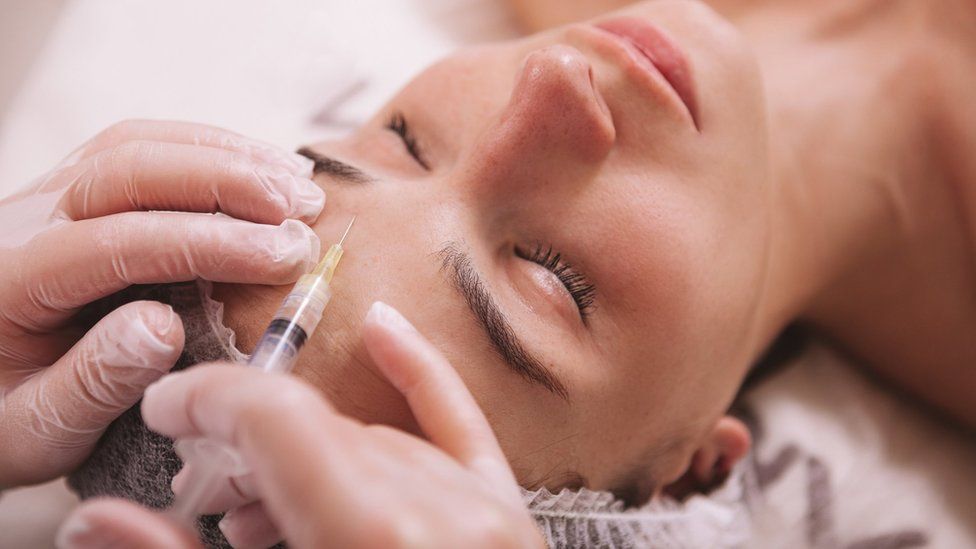ARTICLE AD BOX
 Image source, Getty Images
Image source, Getty Images
The HIV infections are believed to be the first linked to a cosmetic procedure in the US
A recent report on women who contracted HIV after receiving a "vampire facial" has raised questions about the safety of some cosmetic procedures.
At least three women were infected at a spa in New Mexico in 2018, according to a Centers for Disease Control and Prevention (CDC) ireport that said the cases shed light on new ways the infection can spread.
They are believed to be the first-ever HIV transmissions related to a cosmetic procedure documented in the US.
But what exactly is a "vampire facial", and how did the women contract HIV after receiving it? And what can people do to keep themselves safe from infection when getting cosmetic treatments?
Here is a breakdown of what we know and what experts recommend.
What is a Vampire Facial?
The term is a colloquial one for platelet-rich plasma - or PRP - facials.
It involves drawing a patient's blood and then separating out platelet-rich plasma from it using a centrifuge. The plasma is then injected back into the face through tiny needle punctures.
The procedure is said to help repair the skin's barrier by stimulating the production of new collagen and elastin, which can reduce the appearance of wrinkles and acne scars.
It has been around for a while - reality television star Kim Kardashian shared a selfie post-procedure in 2013 where her face appeared bloody.
A few years later Ms Kardashian said that she would not get the treatment again, writing on her website that it was "really rough and painful for me."
The treatment could cost anywhere between $1,000 to $2,000 (£1,600) at a licensed medical spa, according to estimates from providers online.
Image source, Instagram/Kim Kardashian
Image caption,Kim Kardashian posted a photo of herself after receiving a "vampire facial" in 2013
How did the New Mexico women contract HIV?
In summer of 2018, the CDC became aware of an American woman, aged between 40 and 50, who tested positive for HIV while she was abroad.
The woman reported no history of injection drug use or recent blood transfusions, and did not have recent sexual contact with anyone other than her current partner.
She did, however, report getting a vampire facial earlier that year at a spa in New Mexico.
A CDC investigation into the spa - which also provided other injection services, including Botox - later revealed that it was unlicensed and that it had "multiple unsafe infection control practices."
This included "unlabelled tubes of blood and medical injectables" that were stored in a kitchen fridge next to food, as well as "unwrapped syringes" scattered in drawers and on counters.
Some of the blood vials also showed signs of being reused, and the CDC had identified at least one client who had tested positive for HIV before visiting the spa.
The health agency has since tied the spa to five cases of HIV, including four women who had all received a vampire facial treatment between May and September of 2018 and a man who was romantically linked with one of the women.
The late stage of the HIV infections for the man and woman in a relationship indicated they had contracted the disease before the facial, the CDC said
The spa was forced to close in late 2018, and its former owner, 62-year-old Maria de Lourdes Ramos De Ruiz, is serving a three-and-a-half year prison sentence. She pled guilty in 2022 to practicing medicine without a license.
Are cosmetic procedures like vampire facials safe?
There have been hundreds of published medical research papers and trials that suggest the treatments are effective for some sports injuries, acne, eczema and other skin conditions.
Theh American Academy of Dermatology Association says the procedure itself, when done correctly, appears to be safe.
"You may have a bit of pain, bruising and swelling afterwards," the association says. "These tend to go away within a few days."
The biggest risk comes from the way the blood is handled by the facility providing the treatment.
"It's essential that the blood removed from your body be kept sterile. Otherwise, you could develop an infection," the association says.
It is also important to ensure that the blood being injected back belongs to the client, and not someone else, as the recipient could get very sick otherwise.
Experts say that those looking to get cosmetic treatments should research the provider beforehand to make sure the facility is licensed. They should also note how medical equipment - like needles - are being handled by staff.
Vampire facials are not the only cosmetic treatment to make recent headlines after being linked to serious illness.
US health officials warned last week of a botulism outbreak tied to counterfeit Botox, which has sickened 22 people in 11 states - some of whom have since been in hospital.
Botulism is a serious illness with symptoms including blurred vision, difficulty swallowing and breathing, slurred speech and fatigue.
Botox injection is a popular treatment used to smooth wrinkles and make skin appear younger. Injections typically cost around $530 a treatment.
Like with the vampire facials, the CDC advises those looking to get Botox injections to research the treatment provider beforehand, and to make sure that the Botox being used is FDA approved and purchased from a reliable source.

 1 year ago
47
1 year ago
47








 English (US) ·
English (US) ·